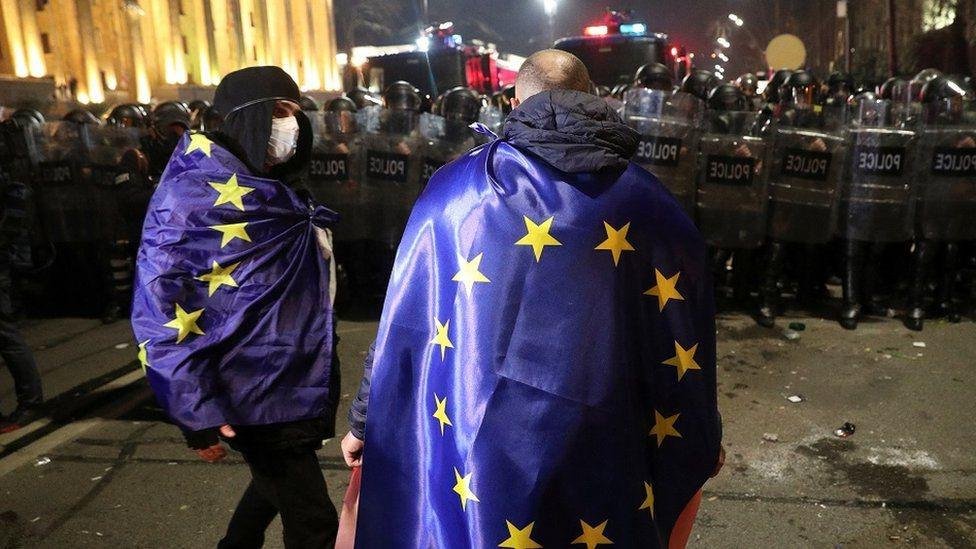Police officers used water cannons and tear gas against protesters in the Georgian capital Tbilisi on the second night.
Crowds are furious over a controversial Russian-style law that designates NGOs and media groups as “foreign agents” if they receive more than 20% of their funding from abroad.
On Wednesday evening, police pushed back protesters who had broken down a metal barrier in front of Parliament.
The crowd was ordered to disperse and several people were injured.
On Wednesday evening,
Georgian television images showed hundreds of police officers with helmets
and shields in their hands on the streets. At least one police car was overturned.
Clouds of tear gas rose in the streets around the Parliament building as police tried to break up protests.
Earlier, tens of thousands had joined the second day of the protests.
They took place outside Parliament, where MPs supported the first reading of the controversial new law on Tuesday, which was widely condemned internationally.
A similar law was used in Russia to severely restrict press freedom and enslave civil society.
“We believe that our government is under Russian influence and that this is very bad for our future,” said Lizzie, one of the many students who took part in the protests.
Demonstrators fear the passage of the new law could end the country’s hopes of joining the EU.
“People are really angry because it’s not about a specific thing, it’s about the future of Georgia and how we’re going to function as a country,” he said.
Another protester, Tekla Tevdorashvili.
“Everyone is really against it and I think that’s why they’re so scared and that’s why the government is trying to use everything they can against the people to silence us, but we let ourselves not silence.”
protests underscore the struggle for Georgia’s future
In the statement, the United States expressed its solidarity with the demonstrators and called on the Georgian government to allow peaceful demonstrations.
“We call on the Georgian government to respect the freedom of peaceful assembly and peaceful protest,” State Department spokesman Ned Price told reporters.
“We stand with the Georgian people and their aspirations.”
President of Ukraine Volodymyr Zelenskyy has also expressed his support for the Georgian nation.
Authorities said 55 police officers were injured during the first night of the protests when stones and petrol bombs were thrown at them.
Some of the most chilling images emerged on Tuesday night when water cannons were sprayed on protesters waving EU flags.
Prime Minister Irakli Gharibashvili denounced the “confusion” surrounding the bill, which passed the first reading in Parliament on Tuesday.
The ruling Georgian Dream Party argues that the regulations date back to US legislation in the 1930s.
The same argument was used by Russia after it passed a similar law in 2012.
Since then, Russian law has been expanded to crack down on Western-funded NGOs, independent media, journalists, and bloggers.
Anyone identified as a foreign agent should now check foreign agent etiquette on their behalf.
TV channels that support the opposition have labeled the bill a “Russian law”.
Georgia has applied for EU candidate status and is also aiming for NATO membership.
Still, EU foreign policy chief Josep Borrell warned that the law was “inconsistent with EU values and standards”.
Another student, Lia Chagovadze, said she and her friends were there to fight for Western values and freedom,
while Nanuka Shakin said the protesters would not allow the government to stop Georgia’s bid for EU membership:
” We will fight them and We won. Don’t rest until we win.”
“They constantly try to do everything to distance us from the European Union, from European values,” said 30-year-old Luka Kimeridze.
Georgian Dream
Chairman Irakli Kobachidze said criticism of the bill as similarly repressive Russian legislation was misleading.
“Eventually the confusion will clear up and the public will have transparency on NGO funding,” he said.
However, Eka Gigauri of Transparency International told a source that NGOs are already subject to 10 different rules and the Treasury has full access to accounts, funding, and other information.
Political tensions in Georgia were exacerbated by Russia’s large-scale invasion of Ukraine,
seen by many Georgians as Moscow’s war of aggression, and several thousand Russians fled the region.
However, the government in Tbilisi has taken a neutral stance, refusing to openly support Ukraine and impose sanctions on Russia.
Georgian President Salome Zurabishvili, visiting New York, expressed on video her support for the protesters: “I am with you.
Today you represent Free Georgia. Georgia, which sees its future in Europe, will not let anyone take that future away from it.”
vetoed the law, but Georgian Dream has enough votes to override the President’s veto in Parliament. The party contacted the Council of Europe for comment.
Passing the law would mean Georgia would be added to the list of anti-democratic, and authoritarian post-Soviet states such as Belarus,
Tajikistan, and Azerbaijan, which have copied the Russian law restricting the activities of NGOs.
Historically, in Russia and Georgia, the term “agent” has the meaning of “spy” and “traitor”, giving negative connotations to the work of civil society.
This suggests that they are acting in the interests of foreign forces, not the good of the country and community.



